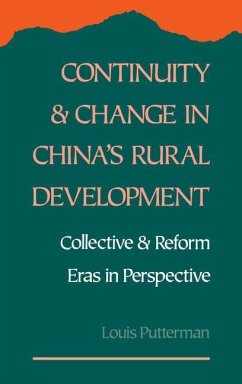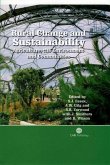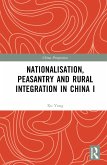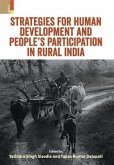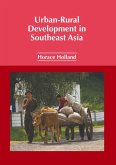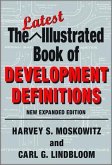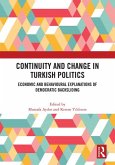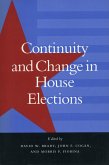This book is a detailed study of rural reform in China. After the death of Mao, and with the ascendency of Deng Xiaoping in 1978, China began a programme of agricultural reform intended to increase productivity. Three major changes moved the agricultural sector from a centrally planned system to a more market-oriented system. First, replacement of collective teams by farming by households. Second, an increase in free markets for rural products, and increase in state prices for farm products, and the partial elimination of the two-tier price system. Third were changes in the economic structure that facilitied greater productivity and a 250 per cent increase in average real rural incomes between 1979 and 1986. This book is unique in that it studies a single township (Dahe in Hebei Province) in depth over the two periods, thus providing a great deal of data about the effects of the reform at the village level.
With the ascendancy of Deng Xiaoping in 1978, China began a program of agricultural reform intended to increase productivity. These rural economic reforms are much celebrated for their dramatic impact on farm output, economic growth, and income. In this detailed study, Louis Putterman examines the major changes in China's agricultural sector: replacement of collective teams with household farming, an increase in free markets for rural products, higher state prices for agricultural products, and greater freedom to expand off-farm activities. Continuity and Change in China's Rural Development brings together a set of theoretical and empirical analyses of the Chinese rural economy in the 1970s and early 1980s based on a local case study, that of Dahe Township in north China's Hebei province. It places these analyses in the context of China's modern rural development record and of the state of knowledge based on other sources. Topics covered include work incentives and labor supply during the collective production period, resource allocation under both the collective and the post-collective institutional regimes, the effects of reform on productivity and resource allocation, land tenure in the post-collective period, and income distribution. In his conclusion, the author argues that anti-incentive and anti-agriculture biases in government policy constitute a strand of continuity connecting the collective and post-collective eras of China's rural development, and that further liberalization of agricultural markets is the most important prescription for a healthier rural economy. This book is unique in its focus on a single township, providing new data on the effects of reform at the villagelevel. It will be of interest to researchers, students, and scholars of the economics of rural and agricultural development.
With the ascendancy of Deng Xiaoping in 1978, China began a program of agricultural reform intended to increase productivity. These rural economic reforms are much celebrated for their dramatic impact on farm output, economic growth, and income. In this detailed study, Louis Putterman examines the major changes in China's agricultural sector: replacement of collective teams with household farming, an increase in free markets for rural products, higher state prices for agricultural products, and greater freedom to expand off-farm activities. Continuity and Change in China's Rural Development brings together a set of theoretical and empirical analyses of the Chinese rural economy in the 1970s and early 1980s based on a local case study, that of Dahe Township in north China's Hebei province. It places these analyses in the context of China's modern rural development record and of the state of knowledge based on other sources. Topics covered include work incentives and labor supply during the collective production period, resource allocation under both the collective and the post-collective institutional regimes, the effects of reform on productivity and resource allocation, land tenure in the post-collective period, and income distribution. In his conclusion, the author argues that anti-incentive and anti-agriculture biases in government policy constitute a strand of continuity connecting the collective and post-collective eras of China's rural development, and that further liberalization of agricultural markets is the most important prescription for a healthier rural economy. This book is unique in its focus on a single township, providing new data on the effects of reform at the villagelevel. It will be of interest to researchers, students, and scholars of the economics of rural and agricultural development.

